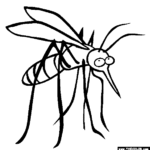 Like most people, I can’t stand mosquitoes. My kids and I are both mosquito magnets and extremely sensitive to mosquito bites, so we spend the majority of our time outdoors trying to ward off or avoid these pesky critters. (My husband, lucky man, has had like seven mosquito bites total in his entire life, and even his most extreme reactions are less severe than my daughter’s most minor reactions.)
Like most people, I can’t stand mosquitoes. My kids and I are both mosquito magnets and extremely sensitive to mosquito bites, so we spend the majority of our time outdoors trying to ward off or avoid these pesky critters. (My husband, lucky man, has had like seven mosquito bites total in his entire life, and even his most extreme reactions are less severe than my daughter’s most minor reactions.)
But now that reports of West Nile Virus cases are on the rise throughout the United States – specifically in Texas, Mississippi, Louisiana, Oklahoma, and South Dakota – we’re taking extra precautions. Thanks to the American Red Cross, by way of the Centers for Disease Control and Prevention (CDC), we now know exactly what we can do to protect ourselves, and as a bonus we learned a bit more about the virus in general and our odds for contracting it.
First, understand your level of risk.
- It’s commonly thought that children are most at risk for contracting the West Nile Virus, but in truth, people over 50 – both those in poor health and those who are healthy – are at a higher risk of getting sick.
- Just because you live, work, or play in an area with a mosquito control program (using products to kills mosquito larvae and adult mosquitoes) doesn’t mean you shouldn’t also follow the precautionary steps listed below. Mosquito control programs don’t eliminate every mosquito.
Second, reduce your chances of contracting the West Nile Virus infection.
- Reduce the number of mosquito bites you get by spraying insect repellent with DEET on both skin and clothing when outside. (More information on applying repellent correctly, including how to safely use repellents containing DEET on both adults and children, can be found here.)
- If possible, stay indoors between dusk and dawn, which are peak mosquito-biting hours.
- Reduce the number of mosquitoes living near your home by eliminating standing water (where mosquitoes breed) in flower pots, bird baths, and gutters, and keep mosquitoes from entering your home by fixing any holes in your window and door screens.
Third, learn how to recognize the symptoms of West Nile Virus.
- Approximately 80% of people infected show no symptoms at all.
- Up to 20% of people infected exhibit mild or moderate symptoms such as fever, headache, body aches, nausea, vomiting, and skin rashes.
- Around one in 150 people infected exhibit severe symptoms such as high fever, headache, neck stiffness, disorientation, coma, tremors, convulsions, muscle weakness, vision loss, numbness and paralysis.
And lastly, don’t panic.
- There is no specific treatment for West Nile Virus. In mild to moderate cases, symptoms generally pass on their own after between a days and a few weeks. In more severe cases, symptoms should be treated at a hospital.
- If you believe you have contracted West Nile Virus and experience severe symptoms (or if you are pregnant or nursing and experience mild to moderate symptoms), seek medical attention immediately.
Stay safe as summer comes to a close!
